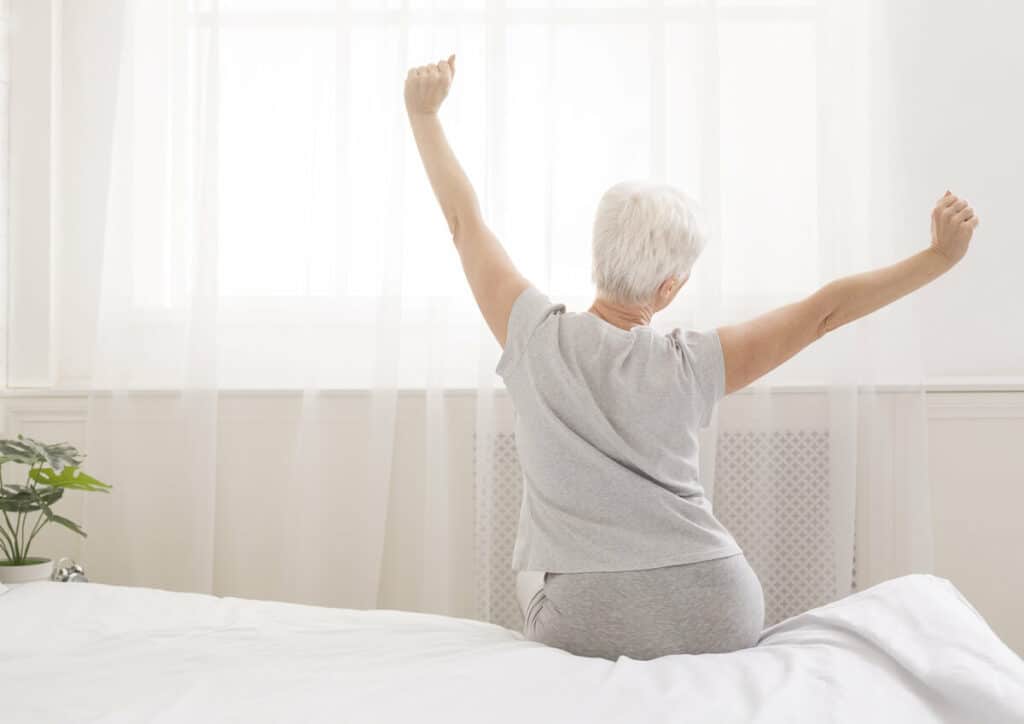Changes in your sleep pattern are par for the course when it comes to getting older. You may find yourself fading before the evening news is over and waking up with every passing car.
If you’re facing sleeping challenges, you’re not alone. According to a recent poll, 46% of adults aged 65 – 80 have trouble falling asleep. Not only does a bad night’s sleep leave you feeling lethargic — it can also increase the risk of health issues, including depression, stroke, and heart disease.
While insomnia in the elderly can be a common problem, there are many steps you can take to ensure you wake up refreshed and ready to take on the day. Discover the best methods for getting a great night’s sleep.
How much sleep does a senior need?
The National Sleep Foundation recommends adults aged 65 and over should receive between 7-9 hours of sleep every night. Extenuating health factors can impact the amount of sleep you need to feel well-rested, so consult with your doctor to find the right sleep schedule for you.
How to Sleep Better
Sleep can improve if you become mindful of your habits and actively consider the factors preventing a restful night.
Create a Nightly Routine
Are you wondering how to fall asleep faster at night? Create a consistent nightly routine. A routine can signal your brain that it’s time for rest. Avoid television, smartphones, and computer screens at least 30 minutes before bedtime. New information can get your mind racing, and the bright glare signals that it’s time to wake up. Instead, practice restful meditation or read a book to unwind into a state of relaxation before sleep. Try to go to sleep at the same time every night, even on weekends and holidays.
Natural Sleep Aids
According to a national poll, 37% of seniors take medication to aid with sleep. Medicine can become habit-forming and poses other risks like nightly falls, memory issues, and confusion. While you should consult with your doctor, natural sleep remedies are the safest option. For a restful night, try these tips:
- Stay active and exercise during the day
- Take a warm bath before bed with jasmine or lavender bath salts
- Do bedtime yoga or light stretching before sleep
- Mist your room with lavender essential oils or a diffuser
- Do deep breathing techniques
Tips for Staying Asleep
Falling asleep is just half the battle when it comes to rest. Sleeping through the night uninterrupted can present another challenge. The following are some of our pro tips for getting your beauty rest like a champ.

Avoid Alcohol Before Bed
A nightcap can help you ease quickly into la-la land, but you will likely find your sleep disturbed once the effects of alcohol wear off. Alcohol reduces rapid eye movement (REM) sleep, inhibits breathing, which can result in sleep apnea, and can become habit-forming. For uninterrupted sleep, cut out the toxins and focus on adjusting your sleep habits instead.
Install Blackout Curtains
The human brain is predisposed to awaken to light, whether it is a street lamp, passing car, or early morning sun. Blackout curtains will help you create a proper sleep nest so you can catch your zzz’s undisturbed from outside light disturbances.
Avoid Drinking Liquid Before Bedtime
Few things are more frustrating than falling asleep only to be awoken because of a full bladder. To avoid nocturia – the increased urge to urinate at night – try to get your daily intake of water throughout the day, and avoid liquids two hours before bed.
Are you still having trouble getting a good night’s sleep? Speak to any of the staff members at Civitas Living to discuss what adjustments we can make in your nightly routine. At Civitas Senior Living, we’re passionate about being there for you. Contact us today.



